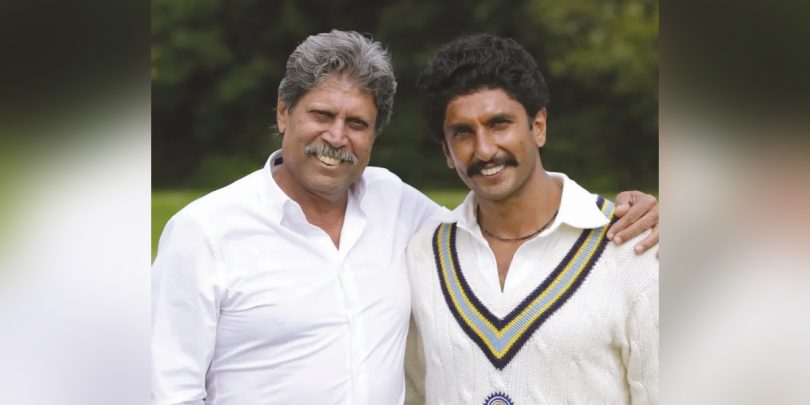Sports films are a rarity in this part of the world, so when a film featuring Pakistan’s favorite sport (Cricket) and in a similar language (Hindi/Urdu) comes by, it automatically makes a connection with the audience. Kabir Khan’s ’83 is one such emotional ride that makes you fall in love with Cricket if you are not already in love with the sport.
The film revolves around the exploits of the Indian Cricket team that won the Cricket World Cup in 1983, under the leadership of Kapil Dev. It might be in the news for depicting Imran Khan as a foreigner instead of a Pakistani, or for using the creative license to make it more interesting, but the fact remains that it was a well-deserved victory for Team India, and Kabir Khan’s presentation was nothing short of being first class.
Everything from the first frame to the final one seems to have been constructed like a painting; the most memorable moment of the event was used in the beginning to grasp the audience’s attention while the rest of the film followed that moment. Add to that the creatively-crafted passport sequence and you had a winner, not even half an hour into the film. Yes, it is true that not even Indians were sure that their team would reach the final, let alone win the World Cup, and that’s what made that win even more unforgettable.
How the Indian team was perceived at home was one thing, how the international media saw them was another angle that Kabir Khan played well with. He highlighted the fact that not even the players believed they were good enough to lift the Cup, yet they gave their best and followed their Captain like soldiers. If he told them that he expected more from them, they gave him more. If he didn’t believe they were giving their best, they proved him wrong in the next match. From little joys to sorrows, the players depicted a solid unit that wouldn’t have stopped at winning the World Cup, if that was a possibility.
And if that’s not all, the way the director mixed both the real and reel footage is nothing short of a masterstroke. The art director must win the awards for he has done an excellent job in transporting the audience into 1983, and then making every player act as if he was the person representing India at the highest level. None of the actors seemed out of character and that’s why when the names of these actors are announced at the end, the audience is surprised to know that they were actors playing the characters.
The film borrows heavily from the many Sports films made in Hollywood but presents it in such a way that the viewers believe it as the truth. Be it Sunil Gavaskar’s reaction to being asked to score by a ‘junior’ Kapil, or the skipper’s anger at Roger Binny’s bowling, it was all there even if it might not have actually happened. Ranveer Singh’s dialogue delivery reminds one of Kapil Dev’s unique way of speaking, and if you have spoken to Kapil Dev (I have!), then you will fall in love with Ranveer Singh for sure.
Everyone in the cast, be it Tahir Raj Bhasin’s Sunil Gavaskar, Jiiva’s Srikkanth, Saqib Saleem’s Mohinder Amarnath, or Pankaj Tripathi’s PR Man, looked perfect in their characters as if they were born to play that part. They not only spoke like those players but even bowled and batted like them, which is a difficult combo to get your hands on for any director.
Casting Sandeep Patil’s son Chirag as his father wasn’t just the only masterstroke by the director, he also cast the sons of West Indian legends Gordon Greenidge, and the late Malcolm Marshall as their fathers, while he made Clive Lloyd’s son Jason play Joel Garner (for his height), and Shivnarine Chanderpaul’s son Tagenarine as Larry Gomes (for his fair skin). The rest of the actors who played Viv Richards, Clive Lloyd, Michael Holding, and Wayne Daniel also looked their part, and exude the same confidence.
For a country that hasn’t been able to bring its finest Cricket hour – Cricket World Cup played in 1992 – on the celluloid, ’83 is more than a film. It’s a template of sorts for those who want to make a film on the World Cup where Imran Khan-led Pakistan to a historic victory Down Under. Director Kabir Khan teaches young minds how to construct a story around an event, how to make it believable and how to sell it as something that actually happened, even if it didn’t happen that way.
There were a few inconsistencies in the film that could have been avoided – Kapil Dev’s World Record of 175 runs was a huge inning but it didn’t come in the Do or Die match; also, there was no mention of Zimbabwe’s win against Australia that helped India in a big way. Casting Mohinder Amarnath as his legendary father Lala Amarnath was not a good idea, and neither was using Kapil Dev as a spectator; such things look good on TV but in films where two characters are already playing you, these stars should have politely declined to act.
Although I am not an Indian and have hardly ever supported the Indian Cricket team, there were moments that made me emotional and moist-eyed. That had more to do with the Script than anything else, for the writers knew how to hit it where it hurts the most. The scene where Pankaj Tripathi’s character tells his Captain that they might have become independent, but they are not viewed as equals gives you goosebumps, for Pakistan became independent a day earlier only. The sequence where a young boy tells Kapil Dev that he will not be attending India’s matches because they lose, or where Mohinder Amarnath discusses a conversation with his father with Kapil Dev, have enough power to move anyone who is remotely interested in Cricket.
The film is an underdog story that actually happened, where drama, emotion, action (of another sort), and suspense played their part. It’s not just a winner on the pitch, but it also has the same effect on the audience, who take back a lot of things after the nearly-three-hour-long flick. It takes those who had followed the World Cup in 1983 back in time while bringing forward the events of the past for those who were either too young to remember or weren’t even born back then.
Despite knowing the outcome of the matches, and the tournament, the film keeps the audience guessing till the final ball, such is the way it is crafted. The national rhetoric is added to give it the ‘cinema’ feel, but then, there is also the scene, in which the armies of India and Pakistan agree to a ceasefire, just for the final, making Kabir Khan fans in Pakistan happy. No matter how many films named Phantom he makes, he has made his place in the hearts of Pakistanis with one Bajrangi Bhaijan, and done the same with ’83.







